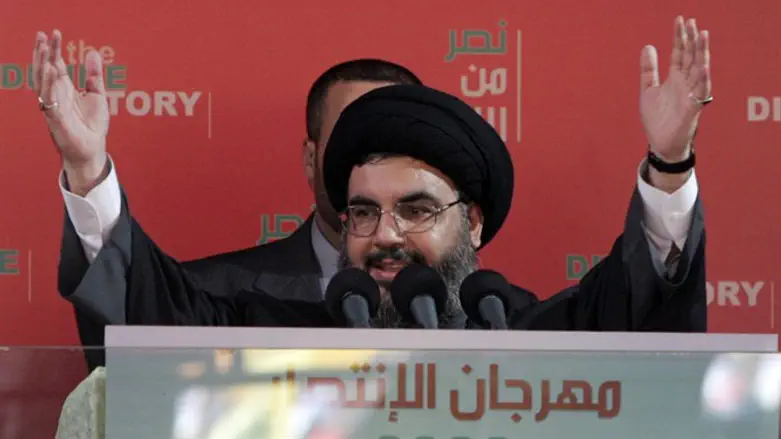
Coercive religious measures taken by Hezbollah against the Lebanese population are garnering protests in the Lebanese media.
The main focus of measures stimulating protest are prohibitions on alcohol and gender mixing between men and women. The protests in Lebanese media reflect the public mood of a large sector of the Lebanese public that supports Hezbollah's political opposition position but opposes the organization's religious posture.
A report published by MEMRI researchers illustrates some examples of enforcement imposed by Hezbollah in these areas:
In July 2016 Lebanese press reported that the Jebchit local council in the province of Nabatiyeh in southern Lebanon ordered a ban on women entering Internet cafes and entertainment venues, and to close these places during prayer times, to "keep town resident's peace of mind and in consideration of Sharia and morals".
The operators of these venues opposed the directive on the grounds that the council has no authority to impose such regulations. Lebanese daily Al-Akhbar, known for its support of Hezbollah, claimed that most of the inhabitants are religious yet they oppose religious coercion. One resident even compared the decision to the conduct of the ISIS organization.
That same month it was reported that the head of the town of al Khiam in southern Lebanon decided to ban women from participating in a marathon competition held in Hasbiyya. The columnist for the Lebanese daily Al-Nahar, Ibrahim Haidar who reported it, noted that the town council is controlled by Hezbollah officials, with a Christian minority living in the town. Later the daily Al-Akhbar reported that despite this decree, thirteen women from the town participated in the marathon.
That same month it was reported that the town council Itron, also in southern Lebanon, ordered a ban on gender mixing at the town's public swimming pool and once again faced opposition to the decision by some residents, most of whom maintain traditional gender separation, but are opposed in principle to any religious coercion on part of the authorities. According to Al-Akhbar, the town council later retracted its decision because of public dissatisfaction.
In January 2017 the daily Al-Akhbar reported that some members of the town council Kfar Ruman, belonging to the Shiite movement Amal and to Hizbollah, worked to promote a petition demanding the closure of liquor shops in the town, signed by twenty-five hundred people.
In response, the governor of al-Nabatiyeh, a city within whose municipal boundaries the town council lies, granted authority to take action against the owners of these stores, but Communist Party and al-Tliah Party council members (an extension of the Iraqi division of the Baath Party) opposed the step at a council meeting as some local residents demonstrated against the decision, claiming that it was contrary to Lebanese law. Consequently, the Council decided to send the issue back to the governor of the province.
On January 16, 2017, the Janubiyya website, known for its opposition to Hezbollah, reported that at an evening event dedicated to the memory of Cuban leader Fidel Castro held in Beirut two days earlier on January 14, event organizers canceled two mandolin performances, following opposition from Hezbollah representatives attending the evening headed by MP Mohammed Raad. This aroused resentment among some of event participants including supporters of the Democratic Youth Union and the Communist Party who left the hall in protest.
These events are mere examples of the state of relations between Hezbollah and Lebanese civilians.
MEMRI researchers show examples of resistance to such measures expressed in Lebanese press outlets both opposing and supporting Hezbollah.
Journalist Ili Fawaz wrote on the site now Lebanon, known for its opposition to Hezbollah, "In Lebanon there is no law against gender mixing at a marathon or at any other activity. Women and men participate together in the Beirut Marathon that takes place every year. So, on what basis did the town council take this decision? Is it not possible to say that the town council violated the law in this case?
"Is it not possible to say that this decision is contrary to the constitution, which, in its preamble states that Lebanon is a parliamentary democratic republic based on respect for freedoms in general, and especially freedom of expression and belief, on social justice and equality of rights and duties among all citizens without discrimination or preference? Does the preamble not mean that the nation is the source of power and sovereignty through legislative institutions? ...
"In these cases it is not a passing problem, but a change in Lebanon's lifestyle. The unfortunate thing is that the state does nothing to decide the matter in order to protect the Constitution by virtue of which it rules and mandates equality among citizens. The state conducts itself as if it accepted the existence of a parallel law, just as it earlier agreed to the existence of parallel Hezbollah weapons and a parallel Hezbollah economy and to more than one governmental authority (hinting that Hezbollah makes decisions by itself).
"This disintegration of state institutions undoubtedly also leads to social disintegration and another crisis to be added to the rest of the crises experienced by Lebanon."
Translated by Mordechai Sones